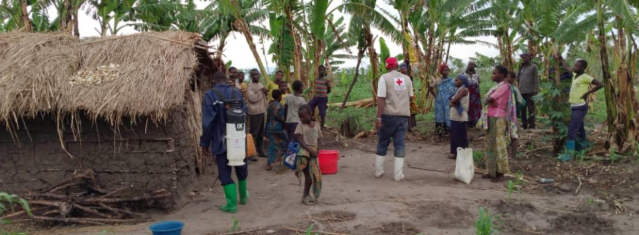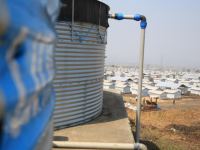News
DRC Humanitarian Crisis Deepens: Grave Violations Against Children Surge by 41%
UNICEF Releases Latest Situation Report

CATI Team decontaminating suspected Cholera house (Source: @Croix-Rouge Nord Kivu)
ARAC Strategic Communications -
In an alarming revelation, UNICEF's latest Humanitarian Situation Report has spotlighted the escalating humanitarian crisis in the Democratic Republic of the Congo (DRC), particularly in the provinces of North Kivu, Ituri, and South Kivu. According to the report, sourced from ReliefWeb and UNICEF, the situation has sharply deteriorated due to renewed combat between armed factions in the Masisi territory, North Kivu province, since late September.
Communities are being compelled to flee the intensifying violence, resulting in internal displacements within Masisi and Rutshuru territories. To date, a staggering 4.9 million people, inclusive of 2.8 million children, urgently need humanitarian aid. Since October 2022, over 1.5 million individuals have been internally displaced, with 800,000 of them being children.
One of the most concerning highlights of the report is the 41% rise in verified cases of grave violations against children compared to the same period in the previous year. This bleak scenario is further darkened by a 40% increase in verified incidents of rape and other sexual violence forms.
While UNICEF has made strides in reaching nearly 700,000 individuals across affected zones since June, achieving 33% of their ambitious target, funding remains a critical concern. The global body has received a mere 2% of the necessary funds since announcing its L3 emergency scale-up.
One of the most concerning highlights of the report is the 41% rise in verified cases of grave violations against children compared to the same period in the previous year. This bleak scenario is further darkened by a 40% increase in verified incidents of rape and other sexual violence forms.
While UNICEF has made strides in reaching nearly 700,000 individuals across affected zones since June, achieving 33% of their ambitious target, funding remains a critical concern. The global body has received a mere 2% of the necessary funds since announcing its L3 emergency scale-up.
UNICEF's $401.3 million budget for the L3 emergency scale-up in eastern DRC seeks to address the surge in violence in multiple territories and the ongoing cholera epidemic in the North and South Kivu provinces. As of June 2023, they have garnered only $8.5 million against the emergency scale-up funding requirements.
The complexity and scale of the crises have exposed entire population groups to unprecedented vulnerability. As conflicts rage on, the rights of women and children are being trampled upon. Last year, over 3,377 grave violations were committed against 2,420 children, with the recruitment and use of child soldiers marking a disturbing trend. This year, reported violations of child recruitment have already surpassed 71% of the total cases in 2022.
The complexity and scale of the crises have exposed entire population groups to unprecedented vulnerability. As conflicts rage on, the rights of women and children are being trampled upon. Last year, over 3,377 grave violations were committed against 2,420 children, with the recruitment and use of child soldiers marking a disturbing trend. This year, reported violations of child recruitment have already surpassed 71% of the total cases in 2022.
Education is another casualty of this ongoing turmoil. Over 1,000 schools have shut down in the eastern DRC, depriving children of learning, some for the third consecutive year. These closures also expose children to risks, including early marriage and recruitment into armed groups. Despite these hurdles, there is a glimmer of hope as schools are slowly reopening in Rutshuru and Masisi, with approximately 76% of institutions reportedly resuming operations.
The region's health is also at risk. The DRC has reported the highest number of suspected cholera cases and deaths in West and Central African countries in 2023. North Kivu and South Kivu combined account for 80% of all suspected cholera cases in DRC. Furthermore, a measles epidemic has rampaged through the eastern provinces, affecting a significant portion of children.
UNICEF has extended its gratitude to all public and private donors for their contributions, even as it underscores the pressing need for more funding to meet the escalating humanitarian demands in the DRC.
Source: ReliefWeb & UNICEF
The region's health is also at risk. The DRC has reported the highest number of suspected cholera cases and deaths in West and Central African countries in 2023. North Kivu and South Kivu combined account for 80% of all suspected cholera cases in DRC. Furthermore, a measles epidemic has rampaged through the eastern provinces, affecting a significant portion of children.
UNICEF has extended its gratitude to all public and private donors for their contributions, even as it underscores the pressing need for more funding to meet the escalating humanitarian demands in the DRC.
Source: ReliefWeb & UNICEF
Liability for this article lies with the author, who also holds the copyright. Editorial content from USPA may be quoted on other websites as long as the quote comprises no more than 5% of the entire text, is marked as such and the source is named (via hyperlink).






